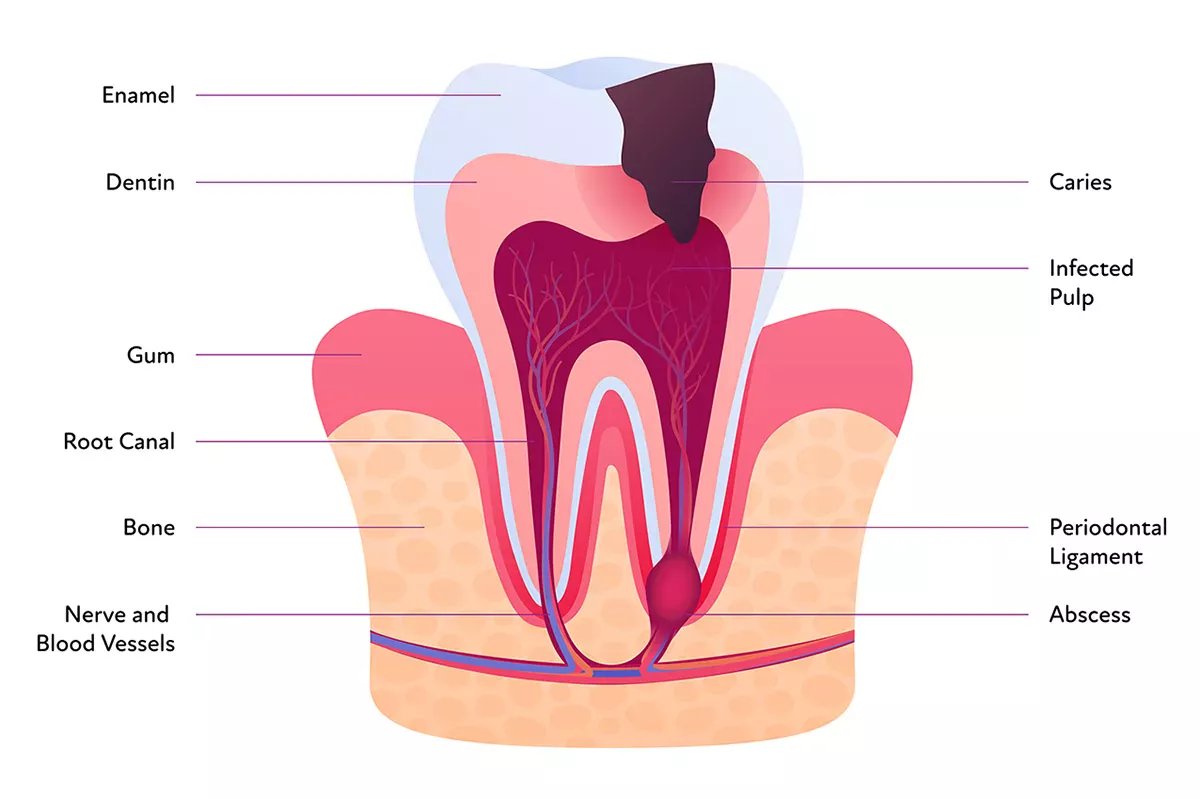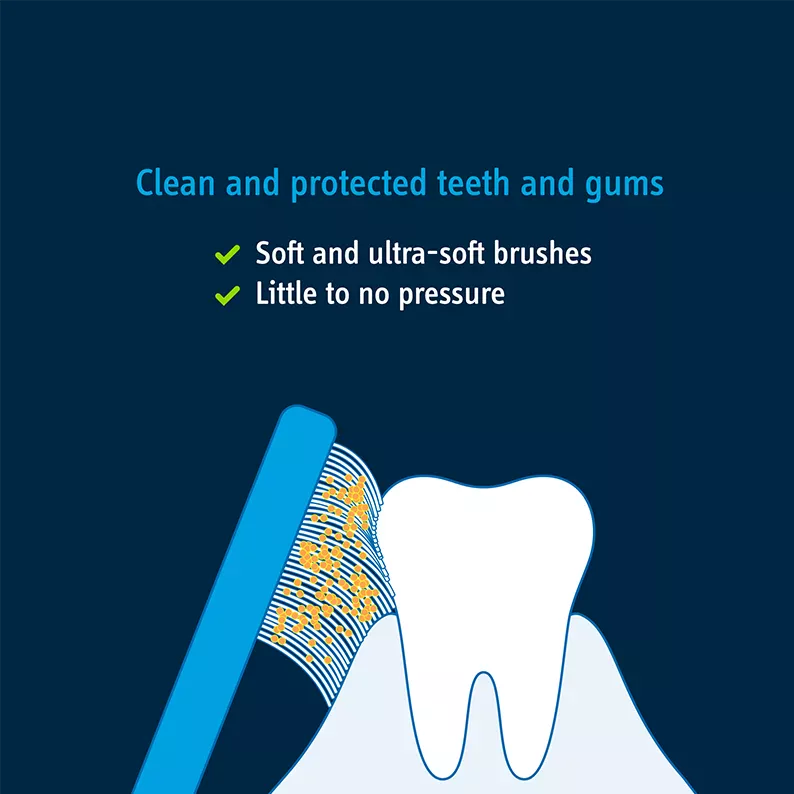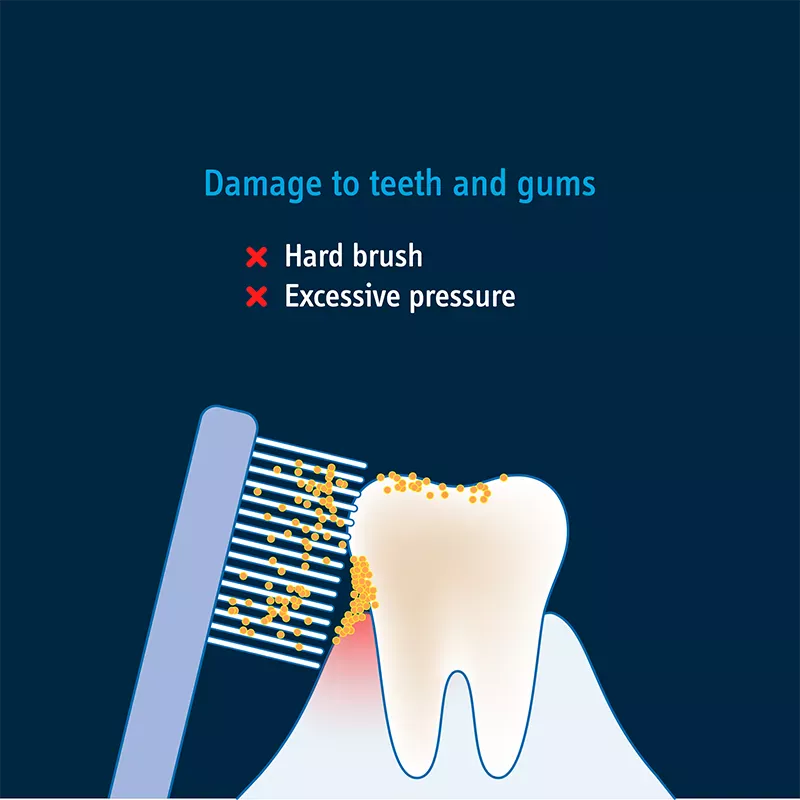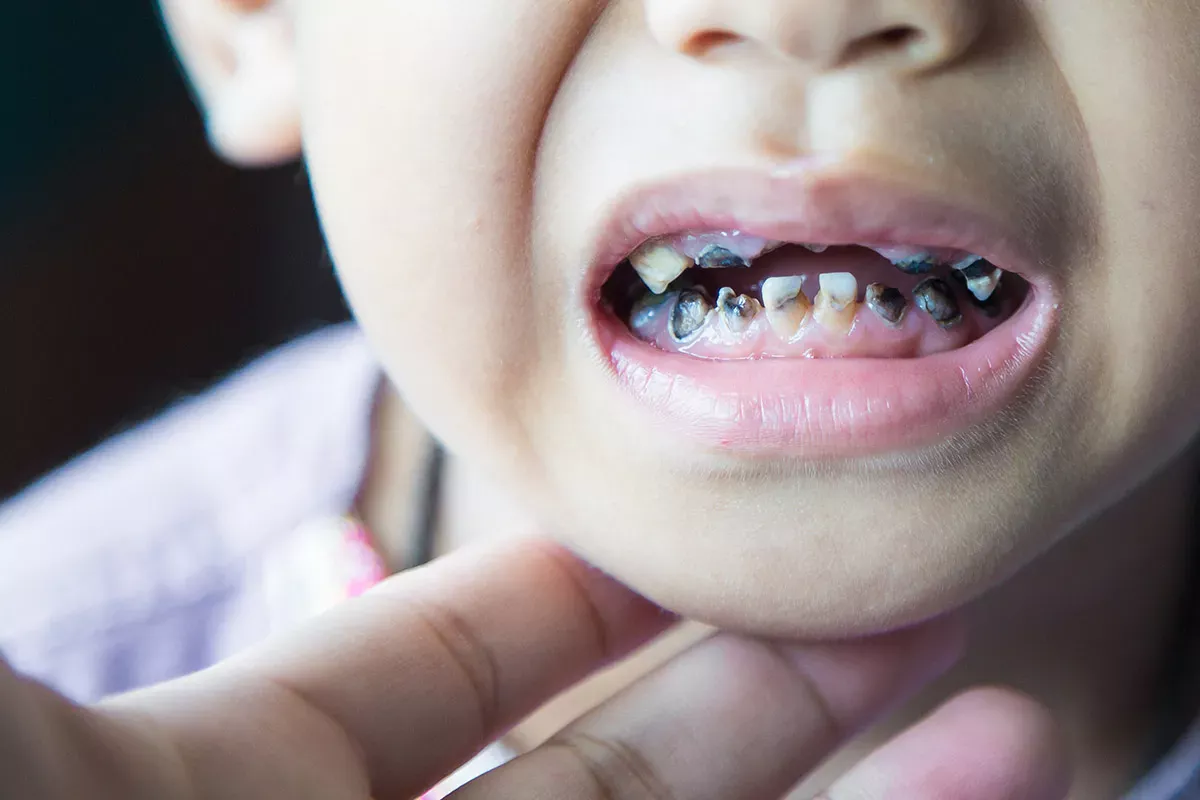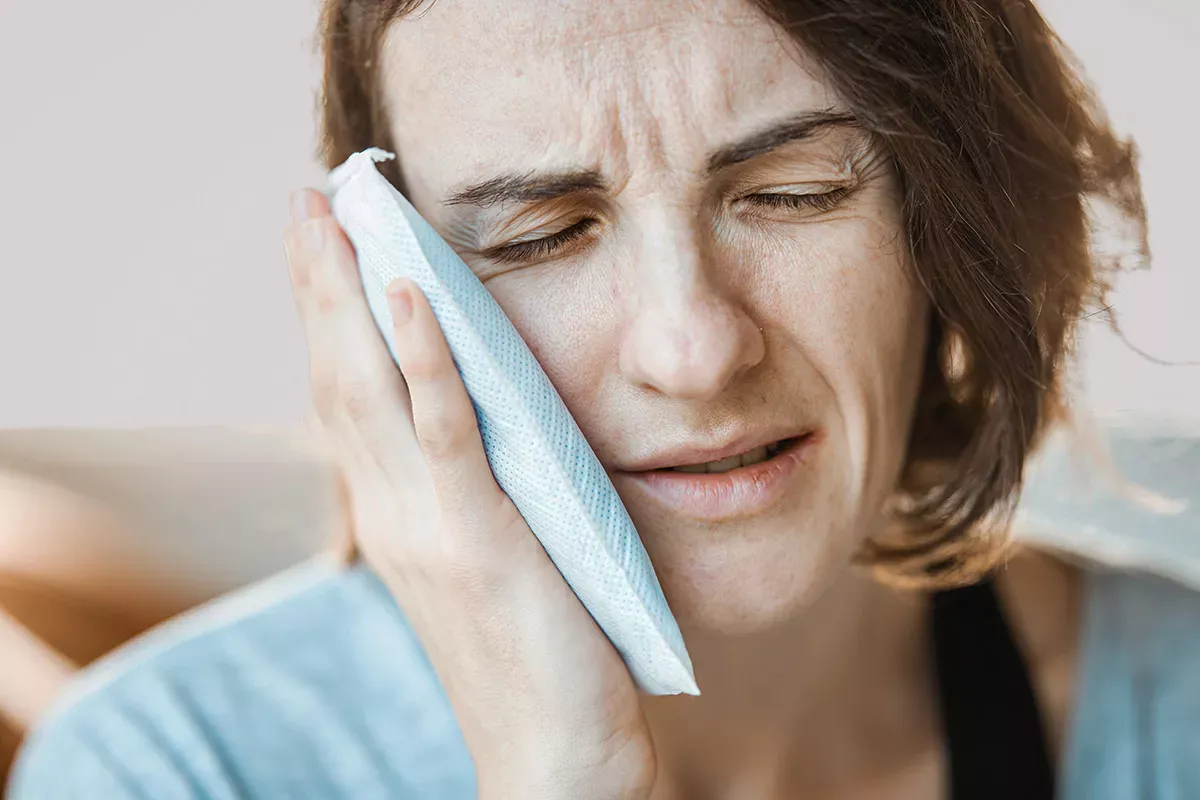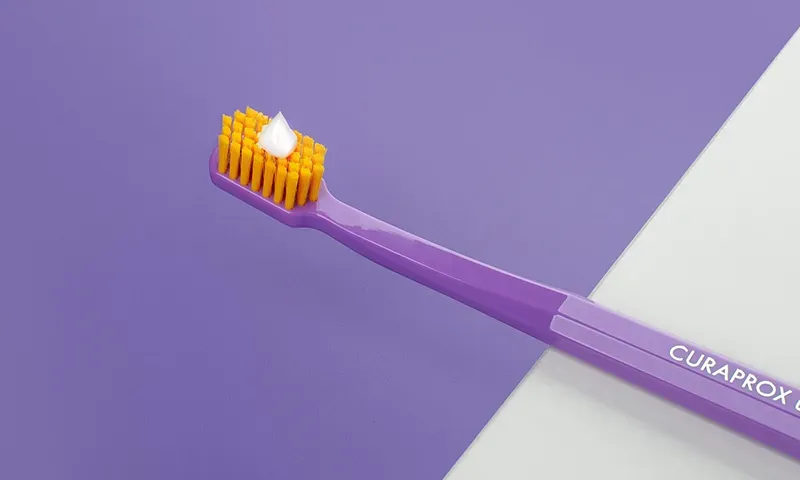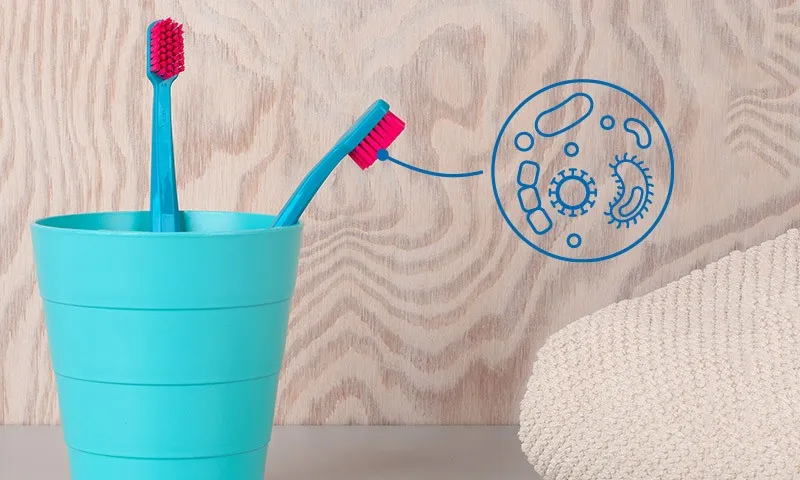What is a toothache and how does it feel?
Toothache is without a doubt extremely unpleasant. Whether molar, incisor, upper jaw or lower jaw - the pain can occur in the teeth throughout the mouth, above and below at the same time and both in one and in several teeth. It is not possible to give a general description of what a toothache feels like. The sensation varies from person to person and also depends on the underlying disease.
Some patients, for example, suffer extremely from their pain, need a sick note and have to go immediately to emergency service with their complaints. Others describe the pain as moderate. Some patients feel a throbbing in their tooth, others have a pulling or pulsating sensation. Toothache can also come and go or last continuously, sometimes it is suddenly gone. Toothache can also be first noticed when biting - for example when chewing hard food or even when drinking. Sometimes the toothache is also worse with exercise such as running or jogging.
It is important that you describe your symptoms in detail to the dentist. They can provide information about the cause of the toothache.
Causes of toothache
There are many reasons for toothache. We have summarised the possible causes for you here. However, remember that only a dentist can make a diagnosis and recommend a sensible treatment after a thorough examination.
Caries
Caries is mainly caused by inadequate oral hygiene. If we do not regularly remove plaque and tartar from our teeth, bacteria spread that convert sugar into acids. These acids attack our tooth enamel. At first, we don't even notice these processes. Even when the first so-called yellowish or brownish "enamel spots" become visible, most people do not yet feel any pain.
However, if the disease progresses and reaches the dentine, not only the classic dark holes develop, but also the discomfort. The tooth hurts and reacts sensitively to hot, cold and sweet things (for example, when biting into a chocolate). If the caries has penetrated into the pulp, those affected often experience a very strong and lasting pain. However, it can also be that this pain suddenly stops again. However, this is not a good sign, but only an indication that the tooth nerve has been permanently damaged.
Good to know:
Would you like more background information on the topic of caries? Then continue reading here:
Inflammation of the tooth nerve (pulpitis)
If caries bacteria have even penetrated into the root of the tooth, the tooth nerve can become inflamed; this is called pulpitis. If this inflammation now spreads over the tip of the root into the jawbone and the surrounding tissue, there is usually severe pain and also a "thick cheek", which is an abscess - i.e. a collection of pus. In this case, root canal treatment and opening of the abscess are unavoidable.
Exposed necks of teeth
The dreaded tooth decay does not always have to be behind your toothache. Sometimes those affected "only" suffer from very sensitive teeth; this can also be very unpleasant. In most cases, the sensitivity is caused by the gums retracting and exposing the necks of the teeth. This is where thousands of tiny nerve fibres are located, which are now completely unprotected when they encounter heat, cold and touch and react to this with pain. Why some people suffer from exposed necks of teeth is individual. Some reasons include misaligned teeth or night grinding. Another cause can be that those affected use the wrong technique when brushing their teeth and thus unknowingly promote gum recession.
Another reason for exposed necks of teeth can also be Periodontitis (colloquially: Periodontosis ) - i.e. a chronic inflammation of the periodontium caused by bacteria. The inflammation itself does not usually hurt. However, with this disease, the gums recede over time - which can become noticeable through sensitive teeth and the associated toothache.
Tooth eruptions
When babies get their milk teeth, they can suffer from toothache. Parents usually notice this through crying, whining, poorer food intake or even fever. However, all this does not necessarily have to occur. There are children who do not react at all to the eruption of milk teeth. If your child is one of those with a toothache, there are a few ways to get relief. For example, you can get teething rings at the pharmacy that can be cooled and are good for the baby's mouth. Many parents also swear by pain-relieving gels that they apply directly to the affected areas. It is best to ask your paediatrician or the pharmacy for advice.
Good to know:
Is your baby teething and obviously in pain? Then teething rings like the Curaprox baby teething ring could provide him with relief. The teething ring massages your child's gums, promotes blood circulation and relieves the feeling of pressure. Tip: Many babies also find it pleasant if the teething ring has been cooled a little in the fridge.
Wisdom teeth can also cause toothache when they erupt. This is usually not the case until adolescence or early adulthood. If pain occurs, it is advisable to visit the dentist. He can check whether the wisdom tooth can grow unhindered and will prescribe ointments, creams, antiseptic mouthwashes or, if necessary, a painkiller to relieve the pain.
Good to know:
Good oral hygiene has to be learned: In our guide on how to brush your teeth properly, you'll learn how to clean your teeth and gums effectively while still being gentle on them.
Defective fillings or damaged dentures
If a filling in the mouth is damaged or crowns and bridges are defective, they no longer fulfil their purpose; namely, to optimally protect the sensitive interior of the tooth from external influences. Hot, cold or sweet foods can then cause toothache - also under a filling, bridge or crown.
Dental accidents
It is obvious that teeth can hurt if they have been affected in an accident. The pain can also occur some time after the incident. So keep the accident in mind if you suddenly feel discomfort and go to the dentist once too often.
Dental erosions and abrasions
When teeth erode, the hard tooth substance gradually disappears. This is due to acids that come from our stomach, for example, and enter the mouth through heartburn or vomiting. Acidic components of medicines, acids in food such as fruit can also damage the teeth accordingly. We speak of tooth abrasion when cracks appear in the enamel or defects in the neck of the tooth. Chipping can also occur and on the front teeth. This is caused by friction exerting pressure on the teeth - for example, when you grind your teeth at night. Tooth erosions and abrasions can lead to toothache because the enamel is no longer intact and can no longer adequately protect the sensitive dentin.
Heart attack and angina pectoris
Toothache can be a harbinger of a heart attack and a symptom of angina pectoris (chest tightness). Unfortunately, this knowledge is not yet widespread. Most people associate chest pain in particular with a heart attack. But it can also radiate to the back, arm, stomach or even the jaw. If toothache occurs and is accompanied by other symptoms such as shortness of breath, nausea, sweating or poor circulation, the emergency doctor should be called immediately.
Sinusitis (inflammation of the sinuses), ear infection
In the case of sinusitis, pain can occur in several teeth at once in the upper jaw. Some patients feel pain when pressure is applied to their teeth, while others may have teeth that are sensitive to knocking. Teeth can also hurt with ear infections, just like with a cold.
Shingles (herpes zoster)
Shingles can also cause toothache; but only if the viral disease occurs on the face.
Headache, migraine
Toothache can be a side effect of headache or migraine.
Trigeminal neuralgia
This is a chronic pain disorder of the trigeminal nerve. It is responsible for the sensory perception of the face, the mucous membranes in the mouth and nose and the cornea. It also motorically controls a large part of the chewing muscles. In this disease, a toothache can occur in a flash. Often a whole row of teeth hurts; possibly also the gums and jaw.
Jaw cysts, inflammation of the jaw bone
Jaw cysts often remain asymptomatic for a long time. Pain usually only occurs when the cyst is already very large and presses on an adjacent nerve. Then pain can also occur in the teeth. It is important to consult a dentist quickly if you have any doubts or suspect a cyst. An inflammation of the jawbone can also lead to toothache, as the teeth, nerves and bone substance can also be damaged in this case. The pain can even affect the whole face.
After filling or root canal treatment
Teeth can also become sore after dental treatment. This is because the dentist is performing a procedure in the mouth that can irritate the teeth and gums. For example, if he puts a filling in a decayed tooth, he has to push the gums back a little if the hole is on the side. An anaesthetic injection is also often used. The puncture site can also hurt after the treatment - and not only the puncture site: the entire tooth can also continue to hurt for a few hours or even days after drilling . It is usually enough to give the tooth as much rest as possible. If the discomfort does not go away, you should of course go to the dentist again.
Toothache is not uncommon after root canal treatment. Patients often report pulling, throbbing or pressing pain. You may also experience discomfort when eating. If the pain does not subside after a few days, you should talk to your dentist again.
What should I bear in mind during root canal treatment?
If you are having wisdom tooth surgery, you will definitely have to be prepared for tooth pain; although, strictly speaking, it is not the tooth that hurts, but the wound caused by the removal. Your dentist will prescribe appropriate pain-relieving medication.
After teeth cleaning
In the best case, a tooth cleaning should not cause any pain. However, this cannot be completely ruled out if you suffer from very sensitive teeth. In these cases, even cold water can cause unpleasant sensations. If this happens to you, just talk to the staff and express your concerns. Your whole mouth may also feel a little different after your teeth have been cleaned. Your gums and teeth may have been slightly irritated by the cleaning, so they may be more sensitive than before. This discomfort should disappear by itself after a short time.
After bleaching
White teeth - that's what many people dream of, and sometimes they have to endure quite ruthless bleaching procedures to get them. Bleaching is done with chemicals, which can have strong side effects on teeth. For example, some patients suffer from hypersensitive teeth afterwards. If the gums accidentally come into contact with the bleaching agent, it can also lead to gum irritation. Bleaching should therefore be carefully considered. Those who do not want to run the risk of toothache can opt for whitening toothpastes.
Good to know:
Curaden's Black is White toothpaste gently brightens the colour of your teeth with its activated charcoal. It gently removes discolouration without bleaching or sanding. It also contains fluoride and enzymes that support our natural saliva protection function.
Through tension and stress
The dentist finds nothing during the examination, even though you have a toothache? In this case, it could be that tension is behind your complaints. It is not uncommon for them to affect our entire body and also our psyche. If tension occurs in the neck or there is a cervical spine block (cervical spine block), the pain can be transmitted via the nerve pathways, so that a toothache can also develop. In addition, many people press their teeth too tightly together under stress and tension without noticing it - this can also lead to painful teeth. Nocturnal teeth grinding can also be triggered by tension and stress.
So if your examination does not reveal any findings, your dentist will certainly discuss these options and advise you on them. A dental splint, for example, usually helps quite a bit against night grinding.
What to do about teeth grinding?
Braces
Braces can cause toothache. They can often occur with both loose and fixed braces, for example, when the teeth have not yet become accustomed to the new pressure. However, this type of toothache should subside after a few days. Wires can also sting with fixed braces. In this case, patients should visit their orthodontist again to prevent sores and aphtae in the mouth.
In which phases of life does toothache occur?
In principle, you can get a toothache at any time. It depends less on your stage of life and more on your state of health and, very importantly, on your oral hygiene. This is because the pain is often caused by tooth decay. However, there are some phases in life when we are more prone to toothache. Here is an overview.
Pregnancy
During pregnancy the hormones change. This increases the blood supply to the gums. They become softer and sometimes swollen. During this time, the gums are more susceptible to inflammation. In addition, many pregnant women suffer from nausea at the beginning and therefore vomit more often. Then the stomach acid rises and gets to the teeth, which attacks the enamel. The teeth are then more susceptible to caries, which can cause toothache. Pregnant women should therefore pay special attention to good oral hygiene and a balanced diet.
Good to know:
As pregnant women are more prone to gum inflammation, effective but gentle dental care is important. Toothbrush CS 12460 from Curaprox is ideal for this - even if gum inflammation has already occurred.
Childhood
Children can quickly develop toothache. The best-known cause is, of course, tooth decay. Children, especially toddlers , are usually not yet able to brush their teeth thoroughly and properly, so that one or the other spot is often forgotten. It is the parents' responsibility to accompany the brushing and, in the case of smaller children, to brush again. However, there are other reasons why children may complain of toothache:
- Wiggly teeth that irritate the gums with their sharp edges
- Injuries in the mouth, which sometimes also remain undetected
- Breakthrough of new teeth
- If your child complains of a toothache and the reason is not obvious to you, you should go to the dentist quickly. As with adults, a toothache can also have a very serious cause, such as an abscess or infection, which needs to be treated quickly.
Baby-age
Even babies can suffer from toothache. The classic is pain that can occur when the milk teeth erupt. But there is also the so-called nursing bottle caries (nursing bottle syndrome). If a baby suffers from this, one or more milk teeth are already affected by caries. They may even already be brown, black or broken through the gums. This is usually caused by feeding the baby sweetened drinks in bottles that the baby sucks on for a very long time.
Toothache at different times of the day
Our perception of pain depends to a certain extent on the time of day. Most people are particularly sensitive to pain in the morning, evening or at night when lying in bed. This is because very few endorphins ("happiness hormones") or endogenous opioids are working in our brain at these times. When these are active, we do not feel pain as intensely. This is a clever trick of nature, because pain at night ensures that we do not simply continue to sleep, but in the best case seek help so that the body is not further damaged.
Feeling more pain in the morning also has a purpose: it ensures that we do not push ourselves to the limit the entire day and thus possibly aggravate our illness. However, it can also be deduced from this: Those who can, should not necessarily schedule their dentist appointment early in the day.
Treating toothache - What to do?
To treat toothache effectively, it is important to know the reason for the discomfort. As you learned above, there are many causes for the pain, so going to the dentist is the first important step. Of course, tooth decay is often behind the discomfort. In this case, the dentist will probably have to drill the affected area and place a filling. Want to know more about treating tooth decay? Read our article "Caries: treatment and prevention" to find out all the important facts.
If tooth decay is not the cause of your toothache, the dentist will investigate further. If, for example, he suspects that your pain is caused by a sinus infection, he will probably refer you to an ENT doctor who will treat the condition accordingly. If the toothache is caused by an inflammation, the treatment may consist of administering an antibiotic. For example, the antibiotic amoxicillin is a frequently prescribed antibiotic for dental neuritis.
If the toothache is caused by grinding your teeth at night, a bite splint could be the right therapy for you. If tension or headaches are behind the toothache, it might be helpful to try relaxation methods such as autogenic training, yoga or meditation.
Good to know:
In the case of toothache, it may also be useful to rinse the mouth with antibacterial Chlorhexamed - for example, if the pain is due to inflammation in the mouth. The Perio plus mouthwash from Curaden protects teeth and gums and also tastes pleasant. Tip: Ask your dentist in advance whether a mouthwash is appropriate in your case.
Painkillers for toothache
As described above, the doctor needs to find the cause of your toothache in order to treat it effectively. However, because acute toothache can be extremely distressing, it is often important for patients to get relief before their appointment. Certain painkillers can be used for this purpose.
Ibuprofen or Paracetamol : Which makes more sense?
Which of these two medicines is more suitable in the fight against toothache? Here it can be said that ibuprofen is the drug of first choice. The reason for this is that this medication has a stronger pain-relieving effect than paracetamol and also has an anti-inflammatory effect, which can be helpful for toothache. It is important to know, however, that ibuprofen has acidic properties and can therefore strain the stomach lining. This can lead to stomach pain. If you are unsure, go to the pharmacy for advice.
You can find out here which painkillers can be used for toothache and which are not:
Aspirin
This very well-known painkiller is used for fever and mild pain. However, it has a blood-thinning effect. So if you are about to have a tooth operation, you should not take aspirin at all. Overall, it can be said that aspirin is not the best remedy for toothache, but is rather used for headaches.
Diclofenac
Diclofenac is effective against pain and inflammation and is typically used for joint pain as well as strains and bruises. In principle, diclofenac is also effective against toothache, but is hardly ever used in dentistry. There are no medical reasons for this. For this reason, patients can use the medication to relieve pain, but should quickly consult a dentist to find the cause.
Novalgin or Tilidine
These two medicines are available only on prescription. It is clearly not advisable to take them independently without consulting a doctor. Tilidine is very strong and has a great potential for dependence. It is possible to use tilidine for toothache, but it should generally only be used for a very short time. Just like Tilidine, Novalgin (active ingredient Metamizol ) is also a very strong painkiller. The active ingredient can generally be used for severe toothache.
Tramadol
This synthetic opioid is only available on prescription and is a very strong painkiller. Here, too, the potential for addiction is very high. The dentist decides whether such a strong drug is indicated for toothache. You should not take it without a recommendation.
Overall, when it comes to painkillers, you should always keep in mind that these medications do not eliminate the cause of your pain, but only suppress the symptoms. Therefore, you should make an appointment with your dentist as soon as possible to get the right treatment.
For toothache Cool or warm?
Many people plagued by toothache wonder whether they can do themselves some good with heat or cold. Unfortunately, there is no general answer; it always depends on the cause behind the discomfort.
If, for example, an inflammation is the reason for the toothache, cooling the affected area can be useful - for example, by applying a cold flannel or a cold compress. The cold constricts the blood vessels, which slows down the inflammatory processes and numbs the painful areas. On the other hand, you should be very careful with heat and stay away from it. Heat actually promotes inflammation and pain.
Home remedy for toothache: What helps?
You should never take a toothache lightly. There may be underlying diseases that need to be treated quickly, such as abscesses or inflammation. However, there are some home remedies that can at least relieve your symptoms. However, they are no substitute for a visit to the doctor. We present some of these home remedies here.
Cloves
Cloves can be effective against toothache. Cloves are enriched with essential oils that are antibacterial and analgesic. You can buy clove oil over-the-counter at the pharmacy. You can dab it on the painful area or alternatively chew on a clove.
Tea tree oil
Using Tea tree oil to combat toothache? Yes, it is possible. Tea tree oil is an essential oil that has a disinfecting and anti-inflammatory effect on toothache. As with clove oil, you can dab the affected areas with tea tree oil or gargle with diluted oil.
Herbal teas
Herbs like sage, chamomile or rosemary also contain essential oils that can relieve your symptoms. You can pour boiling water over the herbs and let them steep. You can then either drink the tea or use the slightly cooled brew as a mouthwash. You can also put fresh rosemary or sage leaves in your mouth and chew on them.
Propolis
Propolis is a resin that bees produce against bacteria and fungi in the hive. It therefore has an effect like an antibiotic and has a disinfecting effect. You can apply propolis drops directly to your gums and teeth or rinse your mouth with a diluted solution. Get advice on the dosage at the pharmacy.
Alternative treatments for toothache?
Many people believe that they can beat their toothache with homeopathy. However, there is no scientific evidence that Globuli and co. have any effect. But of course the placebo effect can make some sufferers feel better for a short time. A visit to the dentist should always be the first priority in case of toothache, even if home remedies and alternative treatments provide temporary relief.
Sources
Bergschneider Dr., Felix: What to do when braces hurt?.
Federal Institute for Drugs and Medical Devices: Metamizole.
dasSuchtportal.de: Tramadol.
Dentolo.de: Toothache with cold: causes, symptoms & treatment and: Toothache in children: Causes, Prevention & Treatment
Deutsche Apotheker Zeitung: Bei Zahnschmerz immer Ibuprofen & Co.? und Zahnschmerztabletten - aber die mit dem Zahn!.
Deutsche Herzstiftung: What is angina pectoris?.
ECDI: Exposed necks of teeth.
Health City Berlin: When the soul makes a toothache.
Society for Dental Health, Function and Aesthetics: Home remedies for toothache: Well proven and: Abrasion: Loss of hard tooth substance on all teeth.
Initiative ProDente: Toothache.
National Association of Statutory Health Insurance Physicians: Periodontitis - causes and effects, and: Dental health during pregnancy.
Leading Health Centers GmbH: Toothache.
Leading Medicine Guide: Jaw inflammation - Find a doctor and information.
Portal der Zahnmedizin: To what extent does the administration of antibiotics (amoxicillin) help with dental neuritis?...
Praxisklinik Nilius: Home remedies for toothache.
Quarks.de: What whitening can mean for your teeth and: That's why it's best to go to the dentist in the afternoon.
University Hospital Zurich: Jaw cysts.
Giessen University Hospital: Dental erosions.
Welt.de: Migraine is more than just a headache.
ZZB-Zahnärzte MVZ GmbH: Tooth eruption in baby teeth.
Zahnärztlicher Notdienst e.V.: Trigeminusneuralgie Zahnschmerzen und: Schmerzmittel Zahnschmerzen.
Dental boutique: Toothache after a filling, and: When too much stress gives you a toothache.
Dentists Deußen: Ibuprofen - important information.
Zahn.de: Breakthrough wisdom tooth.
Dental specialists Theatiner: Root canal treatment pain.
Zahnzentrum Wetzlar: Everything you need to know about toothache.
All websites last accessed on 1.10.2023
 Swiss premium oral care
Swiss premium oral care

